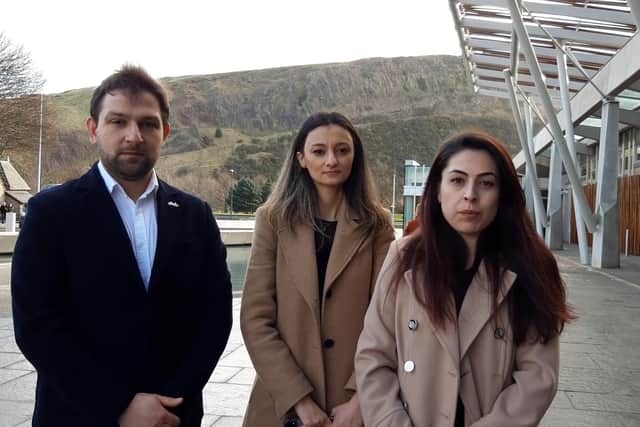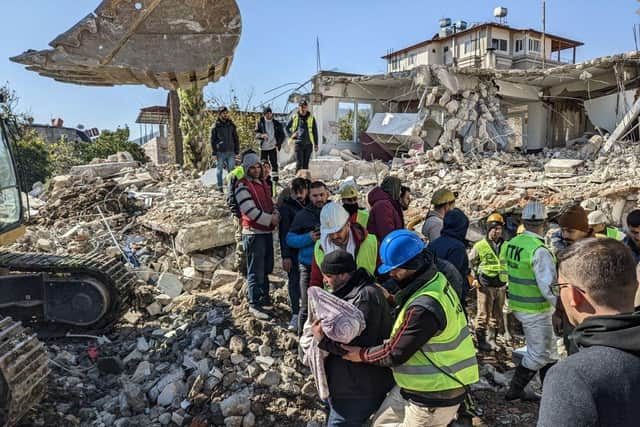Turkey Syria earthquake: Scottish resident reveals heart-breaking moment he found out pregnant cousin was dead
"He has just got a message that his cousin hasn’t made it,” explains Meltem Hiktaniyan, another member of the Association of Turkish Alumni and Students.
Mr Ozyurt’s pregnant cousin, her eight-year-old child, husband and unborn baby are among almost 20,000 people who are now believed to have perished as a result of the 7.8-magnitude quake, which hit Turkey in the early hours of Monday morning.
Advertisement
Hide AdAdvertisement
Hide AdMr Ozyurt said: "They were under the rubble and we hadn’t heard anything about them for three days. Now we found out that as of this morning, they understand that they are dead. She was pregnant.


"You cannot do anything physically, just praying for them and do fundraising. That’s what we can do the best.”
Ms Hiktaniyan’s cousin’s family were also caught up in the disaster. Originally from Ankara, her cousin is a surgeon in the Turkish military and the family – his wife and newborn baby – were living in the south of Turkey, in Hatay, near the Syrian border.
“They are uninjured, but they lost their home,” she said. “They have been living for two days in the car with their newborn baby. After two days, people came to help and his wife and child have been taken to another city to stay with family. But he has stayed to help the rescue effort.
"It is very worrying for me here. The internet connection is on and off, but he is told us they are OK and not to worry. But our family in Ankara is devastated that they couldn't reach them. In Hatay, all of the roads are crushed, so everyone is limited in what they can do.”


Kubra Kaymakci Ustuner, another Turkish PhD student living in Scotland, woke up early on Monday morning to hear the epicentre of the earthquake had occurred close to Kahramanmaras, where her husband’s parents live.
The couple endured a worrying few hours until they managed to get a message from them, to say their house had, incredibly, not been damaged. Ms Ustuner still has friends living in the area who she has not been able to contact.
"My mother and father-in-law are fine, their home is fine, they are the lucky ones,” she said.
Advertisement
Hide AdAdvertisement
Hide Ad"But there are not any buildings, there is not any hospital, markets, food or anything. I can say there is not a city any more. I don’t know how to fix that. We need to help. We cannot do anything physically, but we can collect charity and collect money.”
The first Turkish Airlines flight taking aid from Scotland is due to take off on Friday, carrying donations coordinated by ATAS and other members of the Turkish community. The organisation has now asked for people to donate money rather than physical goods due to a huge response.
Ahmed Subeh, a trainee GP from the Syrian city of Damascus, now living in Glasgow, is supporting members of his community who have lost family members in the disaster.
The conflict in Syria is making it difficult for aid to reach those affected by the earthquake. The region hit by the disaster is partly controlled by the Syrian government and other parts by rebel forces. United Nations secretary general Antonio Guterres confirmed on Thursday the first UN relief convoy had arrived in north-western Syria.
"A friend of mine lost his father to the earthquake,” Mr Subeh said. “They heard the news that his parents’ building had been crushed and relatives and friends went over and managed to save his mother, and his father was alive at first, but lost his leg. But there are no medical teams over there, which unfortunately caused his father to pass away after two hours.
"The news you hear from everyone is horrific.”
More than 70 members of the UK International Search and Rescue Team (UK-ISAR), including four Scottish firefighters, have arrived in Turkey to assist with the search operation.
The ISAR volunteers tweeted to say they were working "24 hours a day" in their recovery efforts. They said they had recently managed to rescue two women, aged 60 and 90, from the rubble.
Meanwhile, aid workers have spoken of the devastation they have witnessed in the region.
Advertisement
Hide AdAdvertisement
Hide AdSalah Aboulgasem, who is working for the charity Islamic Relief in Gaziantep, southern Turkey, arrived 14 hours after the earthquake struck 21 miles east of the city.
He said: "I've been working in the humanitarian space for more than 15 years. I've been to many disaster zones and I've been to many warzones, and I have to say that the size and the scale of this is unprecedented."
Mr Aboulgasem spoke of his shock at visiting Nurdagi, a nearby town of 50,000 people where he said 70 per cent of buildings had been flattened.
"Looking around, there were search and rescue operations going on everywhere," he said. "Everywhere you looked there was a search and rescue going on. The buildings had completely collapsed. It was shocking to see it."
He said survivors were so terrified of buildings collapsing in aftershocks they were remaining out on the streets and living in tents.
Mr Aboulgasem said: "People are cold, very, very cold. People who had buildings or were living in shelters that have not been destroyed, psychologically, emotionally and understandably they are not willing to return to those.
"We did a distribution yesterday of blankets and I have never seen blankets be taken as quickly as they were yesterday. It was unbelievable. It just shows how cold people are now."
Comments
Want to join the conversation? Please or to comment on this article.